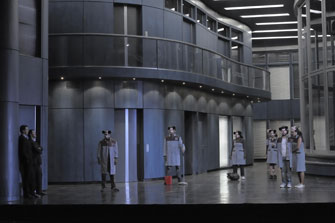The Dark Side of
The Don

A scene from Michael Haneke’s production of Don Giovanni. Photo: Opéra National de Paris/ Charles Duprat
The figure of Don Giovanni (or Don Juan) has long fascinated dramatists, artists and directors alike. He is variously portrayed as a man of mystery, rebellion, charm, danger, violence, darkness or humor. His depiction can often veer between the broadest comedy and the darkest tragedy. The great Austrian film director, Michael Haneke, is the latest to try his hand at directing Mozart and Da Ponte’s operatic version of the perennial seducer. Those familiar with Haneke’s bleakly psychological films will not be astonished to learn that this production at the Bastille Opera is predominantly dark, but they may be slightly more surprised that it is literally so. Around 90 percent of the stage business takes place in such dim light that it is barely possible to distinguish between the different characters, something that may work well in the cinema but that has severe limitations on the stage. Any identification with Don Giovanni, his sidekick Leporello or any of the wronged characters, is compromised by the fact that they are to all intents and purposes faceless.
That said, Haneke has many interesting, effective ideas. His decision to set the opera after-hours in a high-rise building in the testosterone-fueled corporate world works a treat, making real sense of the different hierarchies evident in the piece. Don Giovanni (sung by Peter Mattei) is a young company director, with Leporello (David Bizic) as his assistant. Of the other characters, the Commendatore (Paata Burchuladze) is the company owner, with his daughter Anna’s fiancé Ottavio (played by Patricia Petibon and Bernard Richter respectively) the future owner of the company. Elvira’s portrayal (Véronique Gens) as an executive in a provincial branch of the company explains her return to headquarters in her relentless pursuit of Don Giovanni.
Haneke’s cinematic interest in the disenfranchised of society comes to the fore in the depiction of Zerlina (Gaëlle Arquez) and Masetto (Nahuel di Pierro), who, as Haneke explains in the program notes, are supposed to be of Eastern European origin and part of the company’s multiethnic cleaning team, which has decided to hold a party to celebrate their forthcoming marriage and are surprised to find so many of the company directors in the building at 2am.
Other ideas, however, work less well. Much of the action takes place in a canteen area on the far right of the stage, and, as friends of mine who were at the back of the auditorium on the same night pointed out, all of this side was completely invisible to them. They were even unable to see the city skyline, which is one of the most impressive features of the set. The supper scene with the Commendatore (who emerges in a wheelchair with a white bucket over his head; hardly terrifying stuff) also takes place in the canteen and simply does not work. Given the well-known drug-taking in the corporate world, Haneke might have done well to extend the metaphor and represent the supernatural elements of the plot as part of Don Giovanni’s drug-induced fantasy.
On a musical level, the evening is largely a triumph. Philippe Jordan’s musical direction is characteristically energetic and precise, and all the singing is superb. The only problem lay with the recitatives. Although recitatives normally allow for greater flexibility of performance, Haneke’s decision to punctuate them with long pauses made these sections ponderous and far too slow-paced. The first incarnation of this production took place at the Palais Garnier, and I imagine that the intricacies and intimacies of the music would have been better suited there rather than on the enormous stage and auditorium of the Bastille, where the music often seemed to be swallowed up by the huge space.
Opéra National de Paris: Place de la Bastille, 75012 Paris. Métro: Bastille. Tel.: 0 892 89 90 90 or + 33 (0)1 71 25 24 23 (from abroad). Through April 21. Tickets: €5-€180. www.operadeparis.fr
Support Paris Update by ordering music and books from Paris Update’s Amazon store at no extra cost. Click on your preferred Amazon location: U.K., France, U.S.
Reader Reaction: Click here to respond to this article (your response may be published on this page and is subject to editing).
© 2012 Paris Update
Favorite